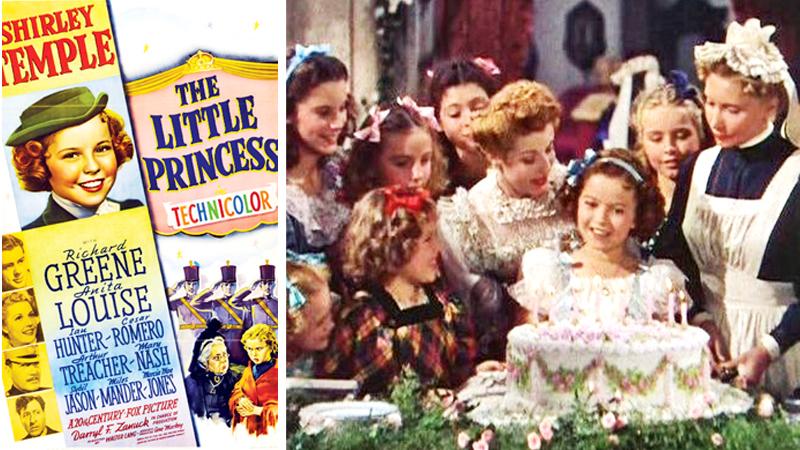
Director Walter Lang’s The Little Princess, a movie released in 1939, based partly on the novel A Little Princess by Frances Hodgson Burnett, is an endearing work of cinema that is heart warming and must be watched by cinema lovers who appreciate the family movie genre. Starring Hollywood’s first child actor to reach international ‘screen stardom’, Shirley Temple, in the lead role as Sarah Crewe, ‘The Little Princess’ was the first Technicolour movie in which Temple acted.
The simple yet profound story of how a little girl simply refuses to give up hope and staves off the gloom and despair that tries to engulf her in London’s highly class minded and rigidly structured Victorian era society, to eventually see her dearest dream realised, makes ‘The Little Princess’ a movie that should be watched by children of today together with their parents.
Temporary parting
The story begins as Captain Crewe of the British Army arrives in London with his little daughter Sarah, as England is readying to deploy soldiers to South Africa to fight the Second Boer War.
Captain Crewe is a widower and his little daughter and he are dearly attached to each other, and thus the juncture at which they have arrived at, is intended as a temporary parting, as Captain Crewe has to leave for South Africa to lead his contingent of troops against the Boers, and little Sarah must be boarded at one of London’s most reputed private school for girls, which is called Miss Minchin’s Seminary.
The school is owned and run by Miss Minchin who is very particular and fastidious about whom she admits to her school.
Captain Crewe’s position as from a reputed family and possessing considerable wealth in the form of holdings in a company in South Africa involved in diamond mining, immediately qualifies Sarah as being a suitable entrant to the school.
Parting with the solemn promise of reuniting soon, Captain Crewe leaves his precious ‘little princess’ in a world that offers her the delights of new friends and social mirth.
However, while the initial going gets enjoyable for little Sarah, bad tidings arrive on her birthday in the form of her father’s solicitor arriving to meet Ms. Minchin, while a splendid party is under way at the school to celebrate Sarah’s birthday. Ms. Minchin is told that Captain Crewe had died in the war and that he has been declared bankrupt as all his assets in South Africa have been confiscated by the Boer forces that overran the British forces and captured the territory held by the British.
Having spent for Sarah’s birthday party on credit on the belief that Captain Crewe will settle all expenses as assured her, Ms. Minchin is distressed that she has now been saddled with a financial burden.
The party is halted abruptly and the gifts that were bought on credit to be gifted by Sarah to all her schoolmates as tokens of her goodwill to them are retracted by Ms. Minchin who wants to return them and minimise her financial losses on account of Sarah.
The bad news is slowly broken to Sarah privately, but she refuses to believe that her father is no more. She sticks to her belief that her father is alive and will eventually reunite with her.
To make matters worse, due to her financial plight, Sarah is made to ‘work for her food and shelter’ at the school, as a servant, and make up for the expenses Ms. Minchin has borne for her since she was admitted as a student.
Hardships
No longer a student but a servant, Sarah is made to undergo the hardships of child labour and the pains of being underfed and sometimes being practically starved by the cold and uncaring senior kitchen staff.
This stage of the story shows a glimpse of how child labour was openly practised in Victorian England and the sad plight of children who were helpless to better their circumstances.
Sarah’s fortitude and optimism, her sense of duty and her unyielding spirit are brought out beautifully by young Shirley Temple whose performance is simply unforgettable! Sarah experiences the life of hardship and also the delights of making lasting friendships across class and age factors, and shows that her endearing and admirable ways can attract her allies and secret supporters as well to aid her cause.
And finally the strength of Sarah’s convictions does indeed come true, as her base of support expands to the point of even a hand of ‘royal patronage’ being granted her that helps Sarah reunite with her father at the dramatic finale as it is shown that Captain Crewe had actually survived the battle in South Africa and had been among the wounded in the army hospital in London suffering loss of memory.
‘The Little Princess’ is the kind of heart warming unforgettably endearing film that is simply a must watch for parents with their children, especially in the holiday season.
It will surely prove to be the kind of ‘family movie experience’ that will create memories to carry forward as the years go by.
